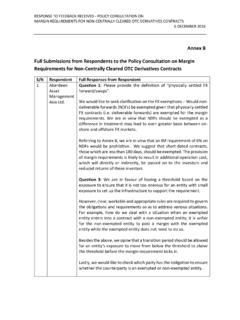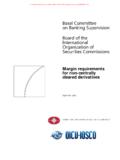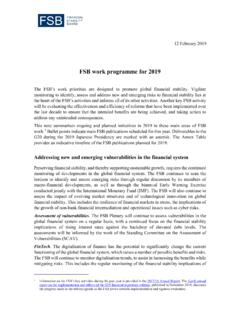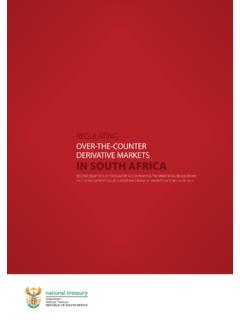Transcription of Interest Rate Derivative Conventions Contents - AFMA
1 June 2020 Interest Rate Derivative Conventions Interest Rate Derivative Conventions Page | 1 Contents Preface: AFMA Code of Conduct .. 2 1. Description .. 2 2. Products .. 2 Forward Rate Agreements .. 2 Interest Rate Swaps .. 3 Basis Swaps .. 3 3. Dealing .. 4 Methods of Dealing .. 4 Electronic Dealing .. 4 Business Days .. 4 Standard Transaction Size (market parcel) .. 5 Two Way Pricing .. 7 Quotation and Dealing .. 7 Basis .. 8 Maturity Conventions .. 8 Settlement Rate or Index .. 9 Premium Payment Date(s) .. 9 Expiry Conventions .. 9 Broker Conventions .. 9 Confidentiality .. 10 Credit .. 10 Exercise of Options .. 10 Data Source .. 10 Pricing Formulae .. 11 Other Dealing Conventions .. 13 4. Confirmation .. 13 Timing .. 13 Obligations of Dealers .. 13 Documentation .. 13 Other Confirmation Conventions .. 13 5. Settlement .. 14 Physical 14 Cash Settlements.
2 14 Other Settlements Conventions .. 15 6. Appendices .. 15 Interest Rate Derivative Conventions Page | 2 Preface: AFMA Code of Conduct AFMA promotes efficiency, integrity and professionalism in Australia s financial markets. The AFMA Code of Conduct (the Code) clearly articulates the ethical principles for minimum acceptable standards of behaviour and supports responsible decision making by firms and individuals engaged in financial markets activities. All AFMA Financial Markets Members and Partner Members1 are expected to observe the Code and operate with integrity, professionalism and competence. The Code is designed to support behaviors that put the interests of clients, the firm and the wider community ahead of personal or individual interests, and promotes confident participation by users in Australia s OTC markets. The Code is presented in two parts the Ethical Principles and the Guidelines.
3 Market participants are reminded that they are generally expected to observe and adhere to the market standards and Conventions as set out below when engaging in any form of market dealing. 1. Description Interest Rate derivatives An Interest rate Derivative is a financial instrument based on an underlying financial security whose value is affected by changes in Interest rates . Interest rate derivatives allow parties to hedge against adverse movements in market Interest rates or to speculate on market movements. The following Interest Rate Derivative Conventions cover the main over-the-counter vanilla instruments in the Australian Interest rate derivatives market. These include Forward Rate Agreements (FRAs) and various types of Interest Rate Swaps (IRS), including Basis Swaps These Conventions reflect current market practices and are maintained by the AFMA Swaps Committee. 2. Products Forward Rate Agreements Forward Rate Agreements A Forward Rate Agreement (FRA) is an agreement between two parties to exchange Interest payments at a future date based on a specified amount at an agreed contract rate.
4 There is no exchange of principal. Instead, there is a net settlement of the Interest differential between the contract rate and the settlement rate (such as the Bank Bill Swap Rate(BBSW)). FRAs can be denominated in any currency ( , AUD, NZD, USD). FRAs are generally not centrally cleared. 1 As defined in the AFMA Constitution Interest Rate Derivative Conventions Page | 3 Interest Rate Swaps Interest Rate Swaps An Interest rate swap is an agreement between two counterparties under which each party agrees to make periodic payments to the other for an agreed period of time, based on a notional amount of principal, with Interest paid in arrears and settled on a net cash basis. A swap, as the name implies, is an exchange of financial obligations. It involves two parties contracting to swap their respective Interest payment flows or their foreign exchange obligations.
5 In a swap the obligations exchanged can be in the same or different currencies and can be at fixed or floating rates of Interest . There are many variations on this theme as per Appendix 1. These Conventions are specific to swap products traded between AFMA members, where at least one side of the swap is in Australian Dollars, although they are applicable to all counterparties that trade or enter into AUD swap products. Swaps denominated in other currencies would be subject to the specific Conventions /rules governing those markets. For the purposes of differentiation, Interest rate swaps where both sides are at floating rates of Interest are called Basis Swaps and are covered in Section The key Interest rate swap products which are not Basis Swaps traded in the Australian Market are as follows: 1. Vanilla Interest Rate Swaps 2. Overnight Index Swaps (OIS) Both Vanilla Interest Rate Swaps and Overnight Index Swaps are generally centrally cleared.
6 A brief description of each of these key products follows. Vanilla Interest Rate Swaps A Vanilla Interest Rate Swap is a form of single currency Interest rate swap in which one party pays a fixed rate of Interest on a notional principal in exchange for a floating rate of Interest ( ; fixed/floating). Depending on the term of the swap, the standard frequency of payments is either quarterly or semi-annually on both sides of the transaction. There is no exchange of principal. Instead, there is a net settlement of the Interest differential between the fixed rate and the floating rate (such as the Bank Bill Swap Rate(BBSW)). A specific type of Vanilla Interest Rate Swap, where the swap agreement is for only one period, is known as a Single Period Swap (SPS). This swap is similar to a Forward Rate Agreement, although the Interest is paid in arrears and settled on a net cash basis at the end of the period.
7 Overnight Index Swaps (OIS) An Overnight Index Swap (OIS) is a form of single currency fixed/floating Interest rate swap. There is no exchange of principal. The floating rate is tied to a daily Interbank Overnight Cash reference rate (RBA30) Basis Swaps Basis Swaps A Basis Swaps is a form of Interest rate swap where both sides of the swap are based on floating rates of Interest . These can be denominated in the same currency or in different currencies. The key Basis Swap products which are traded in the Australian Market are as follows: 1. BBSW/LIBOR Basis Swaps 2. 3s/1s and 3s/6s Basis Swaps 3. Cash/BBSW Swaps (BOBs) Cross currency basis swaps such as BBSW/LIBOR are not centrally cleared, whereas single currency basis swaps are generally centrally cleared. Interest Rate Derivative Conventions Page | 4 A brief description of each of these key products follows. BBSW/LIBOR Basis Swaps A BBSW/Libor Basis Swap is a form of cross currency Interest rate swap in which one party pays a floating rate of Interest in Australian Dollars (AUD) based on a specific AUD principal in exchange for a floating rate of Interest in USD based on a specified USD principal.
8 Principals are usually exchanged at both the start and maturity of the swap. The AUD floating rate is based on BBSW whilst the USD floating rate is based on the London Interbank Offered Rate (LIBOR). 3s/1s and 3s/6s Basis Swaps 3s/1s and 3s/6s Basis Swap is a form of single currency floating/floating Interest rate swaps. There is no exchange of principal. 3s refers to quarterly floating rate payments based on 3mth BBSW. 1s refers to monthly floating rate payments based on 1m BBSW. 6s refers to semi-annual floating rate payments based on 6mth BBSW. Cash/BBSW Swaps (BOBs) A Cash/BBSW Swap is a form of single currency floating/floating Interest rate swap. There is no exchange of principal. The floating rate of the Cash side of the swap is tied to a daily Interbank Overnight Cash reference rate (RBA30). The other floating rate payment is based on BBSW. 3. Dealing Methods of Dealing All Products The main methods of dealing are direct via telephone, via brokers or via electronic platforms.
9 Electronic Dealing All Products The increasing sophistication of financial markets has created a space for brokers, dealers and clients to access markets via electronic platforms. Business Days All Products Good Business Day: A good business day is defined as any day on which banks in the state of New South Wales (NSW) are generally open for business, or a day other than one on which banks in NSW are obliged or permitted to close, excluding Saturday and Sunday. Essentially, NSW business days are weekdays (Monday to Friday) other than NSW public holidays as gazetted under the NSW state government s Banks and Bank Holidays Act 1912. That said Australian OTC markets generally tend to operate in a reduced capacity on gazetted NSW public holidays that are not similarly gazette in Victoria. Non Business Day: A non business day is defined as any day on which banks in the state of NSW are generally obliged or permitted to close, including Saturday and Sunday.
10 Interest Rate Derivative Conventions Page | 5 In general, AFMA recommends that transactions should not be negotiated for settlement or price fixing (rollover) on a non business day. Standard Transaction Size (market parcel) Forward Rate Agreements / Single Period Swaps The dealing volume must be specified when a quote is given. Unless specified otherwise, the following minimum dealing parcels will apply: Maturity Notional Principal 1 month $ 1 billion 3 months $ 500 million 6 months $ 200 million Vanilla Interest Rate Swaps (not including SPS) The following minimum dealing parcels are indicative only. The intent of the below is to reflect a minimum Interest rate risk of $25,000 per basis point to the nearest million in face value. Dealers must agree the actual notional principal at the time of deal. Maturity Notional Principal for Swaps on an EFP basis Notional Principal for Swaps on an Outright basis 1 year $252 million $252 million 2 years $127 million $127 million 3 years $85 million $85 million 4 years $65 million $65 million 5 years $52 million $52 million 6 years $44 million $44 million 7 years $38 million $38 million 8 years $34 million $34 million 9 years $30 million $30 million 10 years $28 million $28 million >10 years $28 million 10 year equivalent $28 million 10 year equivalent Overnight Index Swaps The dealing volume must be specified when a quote is given.





